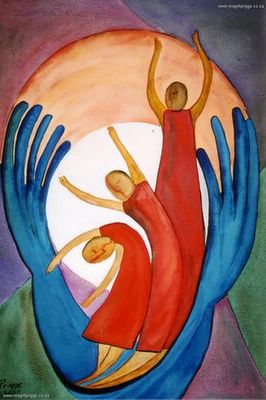But today's Gospel lesson is all about two Nowhere Women.
The first is a woman rendered ritually unclean by what's described as a 12-year hemorrhage of blood; what a contemporary OB/GYN might label dysfunctional uterine bleeding. This disease was not only physically debilitating but also, in Jewish culture of the time, socially disastrous -- a condition that rendered the woman ritually unclean; not only that, but touching her, or being touched by her, would render others unclean as well. So she was, to use the Old Testament terminology, "cut off" from her community unless or until she was made well; there was no place for her otherwise in a society where remaining morally and ritually pure was an all-important, all-encompassing concern.
The second woman in the lesson is scarcely a woman at all; just a girl of twelve. And another nobody, in her own way, even before she fell ill. Because in her culture, her identity and value would always be inextricably and solely tied up in her relationships with men who would hold power over her; in her she would simply transition from daughter of her father to wife of her husband, subject to rules laid down and enforced by them and by the religious, economic and political powers to whom she was subject. And by the time Jesus arrives at her home, she has become truly a nobody, in that great transition from life to death. Now she, at the very cusp of adulthood, had arrived at the same place as her older sister in misery: unclean, "cut off."
Then Jesus shows up. And when Jesus shows up -- the Jesus who, in the Gospel of John, tell us that if we want to know what God is like we just need to see what he, Jesus is like -- nobodies have an uncanny habit of being transformed into somebodies; of being transported from a Nowhereland of rejection and despair to the Somewhere of God's household. And that's exactly what he does here. The bleeding woman -- an object of contempt and fear and most probably self-hatred -- is healed; and not only healed, but addressed as "Daughter," a rebuke to the idea that she is somehow outside the perimeters of God's reign. Likewise, Jesus takes the cold hand of the dead pubescent girl in his -- affirming her inclusion as valuable child of God by violating not only the rule about touching the dead but about touching a (theoretically) sexually mature woman not a wife or immediate female relative.
We all have our personal Nowherelands, cold and dark places where we find ourselves, every day, on the "outside." Jesus brings us in from the cold, in from the nowhere, into the warmth and welcome of God's household -- and not as visitors or hired help, but as sisters and brothers and co-heirs. Jesus challenges us to see ourselves not as "nobodies" but as Somebodies; persons loved and redeemed and called into relationship with him. Moreover, he challenges us, when we meet other "nobodies" around us, to see them as he does, as Somebodies needing the same love and care and community that we've been given.
The Beatles' Nowhere Man makes nowhere plans for nobody. Jesus, the Man For All, has made a Somewhere plan for everybody. That's good news to hear and to share.
"Thalitha Kumi," Magrit Prigge


3 comments:
Thank you for this post. I needed it, I think.
And the artwork you find--awesome!
excellent blog - so good to be reminded of the god man who welcomed all...
Hi, I just came across this webpage - I am the arttist Magrit Prigge who painted Thalitha Kumi! I am honoured that you used it for your post, God bless
Magrit
Post a Comment